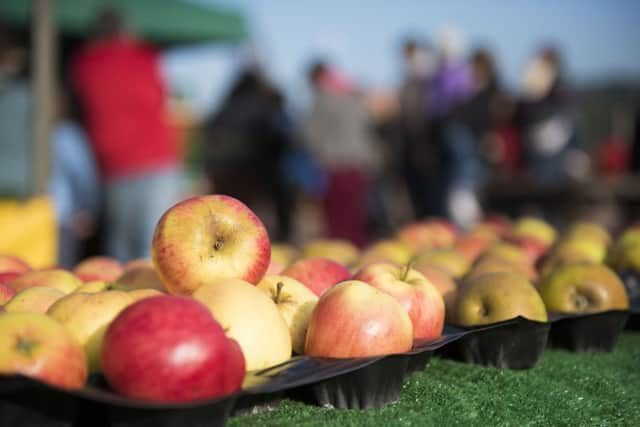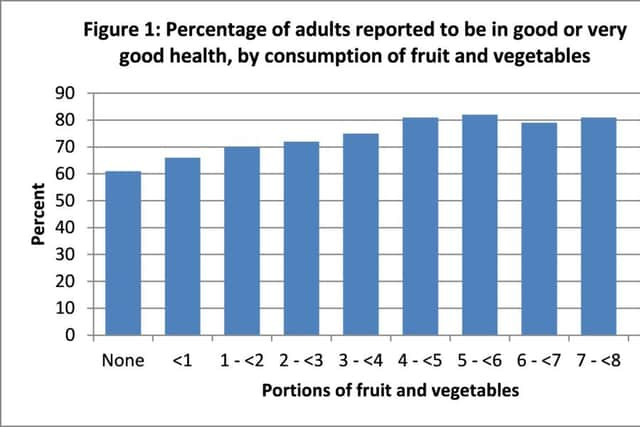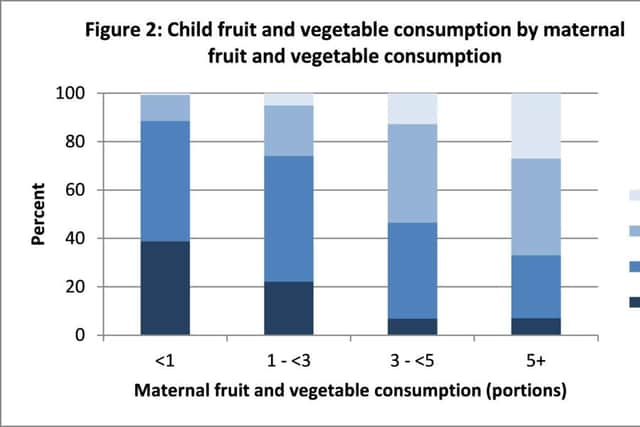Stephen Hinchliffe: Only 1 in 5 adults eat their five-a-day


In 2014, as in 2003, only one in five adults ate the recommended five portions of fruit and vegetables on any given day. The figures for children are lower still, with only one in seven meeting the guidelines – again, a similar figure to that seen in 2003.
But what difference does it really make if we leave the broccoli on the side of the plate? Probably not much this evening, but if it becomes a habit, the chances are it will begin to affect our health.
Advertisement
Hide AdAdvertisement
Hide AdThe Scottish Health Survey demonstrates a clear association between fruit and vegetable intake and self-reported health. While 81 per cent of those who ate four or five portions a day reported good health, this declined steadily to 61 per cent of those who ate none.


To improve our health, should we eat even more fruit and vegetable than the recommended amount?
Possibly not. One criticism of the five-a-day recommendations is that it encourages people to eat more food. Increasing your fruit and vegetable consumption is most likely to be successful if you replace your fudge cake and ice cream with an apple, rather than simply eating more.
The Scottish Health Survey shows that eating beyond five-a-day (or even four) is not associated with any further improvements in self-reported general health (Figure 1). However, we have to be aware that self-reported health is not the only health-related outcome and, as a result, it is important to look at this finding alongside other research. Indeed, other studies have found an inverse relationship between fruit and vegetable consumption, up to 7+ portions, and mortality from all causes, from cancer and from cardiovascular disease.
And then there are the concerns for what an individual’s own eating habits are doing for their children. When parents eat very few portions of fruit and vegetables, it’s very likely that their children will do the same, free school dinners or not.


Of those mothers of children aged between 2 and 15 who ate less than one portion of fruit and vegetables a day, only 1 per cent of their children ate the recommended five-a-day, while 38 per cent also ate less than one portion. Whereas, of those mothers who ate five portions, 27 per cent also ate five portions a day.
Paternal influence, particularly on sons, appeared even larger. A massive 64 per cent of sons whose fathers ate less than one portion of fruit and vegetables also ate less than one portion themselves (albeit based on a fairly small sample size).
The Health Survey report showed that diet, like many other health risk factors, is influenced by where one lives. Adults in the least deprived areas ate an average of one whole portion of fruit and vegetables per day more than those in the most deprived areas (a mean of 3.6 portions in the least deprived and 2.6 in the most deprived). Figures for children were slightly lower (3.2 and 2.4 portions respectively). While free school dinners certainly help in ensuring minimum nutritional standards for children, parental influence does appear to be equally important.
Dr. Stephen Hinchliffe is a Senior Researcher as ScotCen Social Research. His primary focus lies in health and wellbeing and complex data analysis. ScotCen have recently launched What UK Thinks: EU.